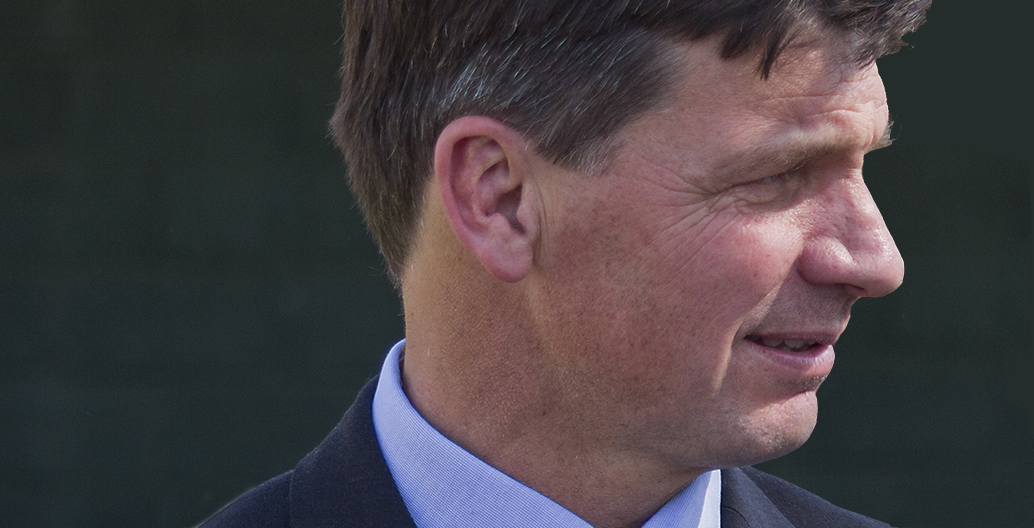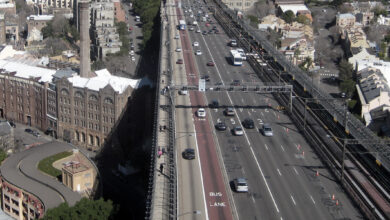
Q&A: Angus Taylor, Assistant Minister for Cities and Digital Transformation
Angus Taylor talks with Foreground about what he sees as the big challenges, and opportunities, facing Australia’s cities.
Angus Taylor on regional cities and his country upbringing
Foreground: Do you approach this job as a country boy?
Angus Taylor: I think you can take the boy out of the country, but you can’t take the country out of the boy, so there’s an element of that. The truth is I’ve spent much of my career wandering around the world, not just Australia. Working on projects in Korea, and New Zealand, and the US, in London. I guess I merged, there’s a combination in me of that traditional upbringing with an experience which was a much more global and urban one. I bring all of that to bear, I suppose, in looking at the issues faced by our cities. It’s one of the reasons why I feel that our cities portfolio needs to cover not just capital cities, but the regional cities as well.
AT: I was very keen to make sure some of our early City Deals were going to be regional cities. In fact the history of City Deals in the UK was they were focused on regional cities, they weren’t focused on London. I felt that that was a good toolkit for addressing some of the challenges of our regional cities, which are different, and they’re particularly focused on how do you create globally competitive, certainly nationally competitive, industries in regional areas? Cities don’t prosper unless they are highly competitive. It doesn’t mean every job has to be highly competitive, but the heart of the city has to be a competitive advantage. Some of our regional cities have struggled with that, and that’s not just true in Australia, that’s true in the US, and in Europe, the UK. That’s an area of great interest to me, and I was very keen to make sure that was part of the portfolio from the start.
Angus Taylor on his politics
FG: Reading through the clippings, you’re an Abbott supporter, Monkey Pod – conservative comes up a lot. You don’t tend to think of that as a natural fit with the cities portfolio, which is sort of Whitlamite…
AT: My politics is a fusion of Burke and Mill, as is the Liberal Party’s politics. Too quickly people want to compartmentalize the Liberal Party in a particular way, and compartmentalize individuals. I think Howard always had the great insight that our side of politics is at its best when it combines liberalism, particularly economic liberalism, and some of the conservative traditions, and that’s very much my politics. My economics has been always that of reform, the need for continual economic change and progress.
Angus Taylor on inequality and “excessive planning”
AT: Look, one of the things I would say is that I think planning has gone too far. I think planning has gone too far. I think one of the sources of inequality in economy, one of the biggest sources of inequality in our economy now is excessive planning of our cities, which has driven up land prices and house prices for the wealthiest.
FG: Is it a synonym for regulation in your mind? Planning is too often restrictive, or…?
AT: It has simply meant we don’t create enough housing in the areas where there are the most job opportunities. The biggest losers of that are those who are the most vulnerable, the least skilled. If you’ve got a great job in a capital city, in Sydney or Melbourne, you’re well paid, you can afford to buy a house near the CBD, within 20 kilometres of the CBD in Sydney, or a little less in Melbourne. You bought a house there, you’ve seen massive escalation in your land values because there hasn’t been enough housing built close to the CBDs, and that’s what’s happened, we’ve seen this massive escalation of land values. You’re the winner twice over, not only are you high-income, you’ve got these huge increases in land values, and many in my generation have made more money out of increases in land values, than they have out of their jobs!
Who’s lost? Someone who lives out in Narellan or Campbelltown, who had a job on the fringe of Sydney, who has struggled to get into the housing market, might have got into the housing market, lost their job in manufacturing, and now needs to commute 50km to the city to have a job […]. They haven’t seen the increase in land values, they were never on a high income in the first place, and now they’re being whacked with the cost of travel to get to work […]. The way our cities are laid out, I think, is the real source of inequality we’re starting to see in the economy…
The real sense in which a political and economic elite have left behind a group of people in the outer suburbs, and to some extent, the regions. I feel very strongly about that, I think that is a serious issue that bad policy, over-regulation, frankly, has been a big part of the cause of that. There is mounting evidence in the United States that this is the case. Obama, just last month, Obama who is obviously a Democrat president, not a Republican one, is pushing very hard, as one of his final legacies, to address this issue. He’s advised by a guy called [Jason] Furman, who’s a very good economist, who’s arguing very strongly that over-regulation has actually caused this.
FG: Right, so that’s how you reconcile perhaps a right-leaning reformist/neo-liberal, though you don’t describe yourself that way, economic kind-of-thrust, with a planning portfolio?
AT: Well I just think the evidence is clear. Government has to play a role in infrastructure, government has to play a role in skill development, which is critical in our cities. Having the right skills, in the right place is a really important issue. Government has to play a role in getting people out of welfare traps, which are a big issue in parts of our cities. There is absolutely a role for government to play, but the assumption that heavy planning, and heavy regulation is actually the way to solve the problems of our cities, I don’t start from that assumption.
Angus Taylor on the loss of manufacturing jobs and a “Sydney of three cities”
AT: What we’ve seen is a shift from a manufacturing-driven economy, or a manufacturing sector that was quite large in this country – it’s less than half of what it was only a few years ago. The thing about manufacturing jobs is they’re more decentralized. They’re often around the edges of our cities, and they’re in regional cities. Services though are different, they tend to be more centralized. As the centres of our cities suck up the jobs, the whole question of local jobs becomes a really, really important one. This is why I strongly support the idea – and now I’m going to be a planner, because we do have to do some strategic planning – I strongly support the idea that we should think of Sydney as the tale of three cities. We should think of Sydney as Sydney, Parramatta, and an outer west based around Penrith, Badgerys Creek, Campbelltown, Liverpool. We need big, prosperous, fast-growing job centres in all three of those. That’s how we create a 30-minute city, we can’t do it any other way. That – local jobs – is really essential, and done right, in combination with housing supply measures, I think you can then start to get to some of the other issues we really need to deal with like amenity, creating the sort of cities people really want to live in. Which we have, we have the bones of that in Sydney, it’s a fantastic city, but there’s more work to do.
Angus Taylor on nation building and city building
AT: You would have seen my family history with the Snowy scheme. I’ve always had a great interest in nation-building, what are the big nation-building projects that are going to make a difference? Everyone wants to hark back to those old, utility-type projects. I actually think the nation-building projects of the 21st century are our cities. It’s how we build our cities. They are now the economic engines, right? We have a service and knowledge-driven economy, that’s where the majority of the economic activity is now. Our cities, the way they’re built, the way they’re planned, the way we invest in them, is nation-building. It is absolutely nation building.
I think in 30 or 40 year’s time, when we look back and say what’s really been the infrastructure that’s been the engine of growth in our economy, I think everyone underestimates the importance of our cities, and the way our cities work. They impact our lives every day, in many, many ways. How long it takes to get to work, whether I’ve got the job I want, the way I interact with my family, and my friends, and my work colleagues, the way I enjoy my life, as well as the way I spend my leisure time. All of those things are hugely impacted by our cities.
Angus Taylor, climate sceptic?
AT: I’ve taken a view that climate change is real. I’ve had that view for many years, and I’ve held that strongly. That there is a very strong case for action. The real debate is what is the right action? I have taken a view at odds with some of the consensus on what the right action is. Particularly in Australia, because of our starting position. I firmly believe that we should be always looking for the lowest-cost way of doing anything. That’s what government’s job is, to use every taxpayer dollar incredibly responsibly. I think to some extent what’s happened in this debate is it has been sidetracked by an attraction to solutions that were not necessarily the fastest, lowest cost or best.
FG: By that you mean the carbon tax? Or the RET?
AT: No, no, well and truly on the record you just have to look at the facts, direct action has been a very low cost way of reducing carbon emissions. I always believed that was the case. I guess, to some extent, it might be my agricultural background. I saw that land-use changes were a very, very powerful way of …
FG: But they’re going up…?
AT: Well land-use changes have been central in reaching our Kyoto targets, that was how we reached our Kyoto targets. I think the IPCC has taken the view for a long while that land-use changes are extremely important in the global climate system. Changes in land-use can have very, very big impacts. That’s why I strongly supported Greg Hunt’s … the approach he’s taken and the methodology he’s developed around this. There is no view, I’ve never held the view that climate change is not something to be taken seriously, or it’s not something that’s happening. My family farm, we’re pretty scientific farmers, and we’ve taken the view that the climate has changed, and will continue to change in the way we make decisions in our farms.
FG: It’s a massive issue for cities, isn’t it?
AT: It is an issue. I think it is an issue.
FG: In Australia, and …
AT: I don’t think we fully … I mean there’s much we don’t understand about climate change. I think that one thing we do understand is that it is happening, and we should be looking to, in a responsible way, take action. It will impact some cities, and some areas of our cities, more than others. Clearly for the west of Sydney, it’s a bigger issue than the east, because it’s hotter, and the climate is more extreme out there. Creating green spaces, making sure that we have enough canopy, enough trees, really important for western Sydney, and it will be a feature in our City Deal. We have some fantastic waterways out there, the Nepean River, Kemps Creek, Souths Creek. We’ve got to use those waterways, and we’ve got to use the vegetation we have out there.
AT: I took a view on this, an early view in our family business, I was pretty strongly challenged, but I took that view, and it’s now a consensus in our business.
FG: When you say you took a goal within the business that says okay we’ve got to get serious about climate change, we’ve got to acknowledge it. What was the call, what was the decision that you faced?
AT: Your view about the rainfall you have in a particular area, or the temperature you face in a particular area, impacts the amount you’ll pay for land. It impacts what you’ll do with that land, whether you’re going to make pasture improvements, or you’re not going to make pasture improvements, for instance. The type of pasture improvements you might make. It has a very big impact on a whole range of decisions you make. We progressively took views about what’s happening to the climate in the south of Australia, the north of Australia, as you move through the different regions, and what it means about water availability. A lot of it was based on CSIRO research actually, which I think has been really quality research.
FG: Right, well that’s a good … I mean I’d be very happy in this story to put paid to any idea that you’re a …
AT: The irony of this one is because I challenge the wind industry as a cheap way to reduce carbon emissions – because it’s not, it’s just not, in Australia, we’ve got much cheaper alternatives – all of a sudden the way those who had vested interests in the wind industry attacked me was to say, “Well he must be a … how could he not love the wind industry? It must be, he’s a climate skeptic.” No, right now it costs electricity buyers, every Australian, $90 a ton to reduce carbon through the wind industry. Direct action is costing us $10. It’s just like, why do I go to the supermarket and pay $90 for something that I could get for $10?
Angus Taylor on City Deals
FG: Okay. On the portfolio, we’ve talked about this, the City Deals, I haven’t really found any strong criticism of it yet. It seems like it’s all too early…
AT: We’re getting somewhere. The thing I would say, is what we know with cities you’ve got to bring a lot of things to bear, to solve these problems of affordable housing, local jobs, less congestion, creating these great 30-minute cities. There’s no single lever that’s going to get you there. We’ve talked about some of them today, less planning restrictions, better investment in infrastructure, more integrated planning, land-use planning along with infrastructure planning. Environmental planning, it’s incredibly important, the environmental planning side of it.
That means you’ve got to be working across all of government, and you’ve got to be working across all levels of government. What a City Deal does is it says that’s what we’re going to do. It says there’s no excuses anymore, there can’t be ‘it’s the state government’s fault’, or ‘it’s the local government’s fault’. It’s actually saying in combination we’re actually going to solve these problems.
FG: Is it a contract?
AT: It is a contract.
FG: Is it legally binding?
AT: It is obviously a politically binding contract, and that’s what matters at the end of the day, because it will be. The City Deals are written, public agreements.
FG: Well there’s nothing public out of this Western Sydney thing…
AT: Sorry, we haven’t done the City Deal yet, that’s saying let’s get going. No, no, but the City Deal, if you want it I can give you the Manchester City Deal, which is the first UK City Deal done five years ago. You’ll see, it’s very clear, it’s very explicit. This is what the central government will do, this is what the local government will do. They’re very explicit agreements, and it’s designed to say we can have a fight over whether land-use planning is state, local, or federal. We can have a fight over whether infrastructure investment is state, local, or federal, but actually the people who live in that city don’t care. They just want the problem solved. What this is doing is, the people saying to the government, “I don’t care who’s responsible, between the three of you, you must be responsible, and the private sector, go away and fix it.” That’s what a City Deal does. It goes away, and it fixes it. Which is why they’ve been a very effective mechanism in the UK to really accelerate the pace at which government solves the problems they’ve got to solve.
FG: Once you have that framework, that’s when you can see larger scale investment?
AT: Yeah, obviously investment is part of it, in some cases it’s about channelling investments we’ve already committed to. For instance, in Launceston we’ve committed to moving University of Tasmania from the outskirts, its campus in Launceston, from the outskirts of the city, to the CBD. That’s a really meaningful move, because it gives us the opportunity to link the university into the city, and link the university into industry. Modern regional cities, many of them now, are built around integration with universities. I mentioned Armidale earlier, it’s just a little local example. You look at Oxford, and Cambridge, that’s their heritage, they’re phenomenally successful models. You see it even in that case of Oxford and Cambridge, enormous development of an industry cluster around those universities since I was there, in the last 20 years.
FG: Have you been back recently?
AT: Yeah, I’ve been back since …
FG: As Minister?
AT: Not as Minister, but I’ve been back recently.
FG: Yeah, and you were struck by it.
AT: It’s always struck me, but it did, I was back there, it was probably five or six years ago, and it did strike me just how much we’re seeing industry and the university living off each other. This is the modern model of a university, we’re seeing it here at UTS, phenomenal. We’re seeing it at the medical faculty at Sydney University with Royal Prince Alfred. We’re seeing lots of examples of it now. In the Launceston City Deal that’s an absolutely central part of it, it’s an investment we committed to before we’d done the City Deal, a lot of the City Deal, a big part of the City Deal is about making that work.
FG: Is it just fluff around, like in Townsville, a new stadium?
AT: No, because if you look at what we’re seeking to do in the stadium, it’s a major urban renewal project. That whole precinct from the ocean, right back down the river to where the stadium is, and beyond, there’s a renewal opportunity which has potential to attract tourists, well beyond people just going to the footie. It has the potential to … It now has in it both the universities, CQU and James Cook, and it has the potential to attract a whole round of additional investment, alongside a major investment we’re making. That’ll be made in defense, as we’ve done this deal with the Singapore government to attract and train their people, their military personnel. It can’t just be about a stadium, or it won’t work. That’s an absolutely crucial part of the Townsville City Deal, it’s about investment in the entire city, not just in the stadium.
FG: Is there much more … As I understand Townsville, western Sydney …
AT: Lonnie…
FG: Lonnie….are the three on the go.
AT: Yeah. There’ll be more… so we’ve already said on the regional cities we’re going to have a contestable process starting in the first part of next year. The thing about a City Deal is they only work if people want them to work. You want willing participants, we don’t want conscripts, we want volunteers. It’ll be a contestable process where regional cities can put forward a proposal for how we might work with them. Of course, we will progressively work through all the capital cities.
Angus Taylor on nation building, the NBN and “smart cities”
AT: I’ve always felt there was more to nation-building than big bucks. Good projects evolve – the Snowy wasn’t created from a grand master plan on day one, let me tell you, it evolved over time. It had to get some early successes, Guthega Dam was in fact its earliest success. It had to get some early successes to then move on from there. The idea that you can come up with a nation building project on the back of a serviette and then demand that it be done, is just crazy, it’s insane.
FG: That’s a dig at Rudd and the NBN …
AT: It wasn’t about the NBN per se. I’m very supportive of the NBN, as it’s evolved, but it was a dig at the way that NBN project came about.
FG: It’s off the point, but I did want to ask you, is there some interplay between the digital transformation side of your responsibility, and the cities side?
AT: Yeah, because there’s a really exciting, smart digital cities side to our cities agenda. One of the really wonderful things about technology is it can take very expensive assets and services – roads, railways, emergency services – and it can use them better. It can find more capacity. You only have to look at Uber, or Airbnb to see how that can be done. Uber is using cars and taxis better than anyone has ever used those assets before. They’re better utilized, lower environmental footprint, cheaper, more customer friendly. Airbnb, the same with accommodation. Technology offers really phenomenal potential to drive more from less, and that’s always a good thing…
It’s the use of technology in our cities that’s important. The humble street lamp is becoming the sensor at the centre of our cities. Not only can it be converted to LED lighting, which by the way is a very cheap way of reducing carbon emissions, it’s a good thing to do. It can also be used as a wireless transmitter, it can be used as a temperature sensor, it can be used as a traffic sensor, to work out whether or not the lights should be on or off. It can be used as an emergency services sensor as well. All of those things from a humble street lamp, these are really big opportunities in our cities that we’re only starting to come to terms with.
Angus Taylor on the future for Australia’s cities
FG: Is there anything [else] in particular that you would like to say, Minister?
AT: Yeah, the really big message is that we’re going to nail the strategy for our cities, and the direction or our cities over the coming years if we work in a collaborative way. Governments have got to collaborate, federal, state, and local. Public and private sectors have got to collaborate. It’s those collaborations that’ll make us or break us in the nation-building efforts that we put into building our cities. That’s a really crucial point, because we’ve spent too much time brawling between governments. Public sector is saying that the private sector doesn’t understand. The private sector is saying the public sector doesn’t understand. We’ve got to get above that, and everything I do every day, and the Prime Minister does every day that is actually in the city spaces is focused on that very simple principle.


